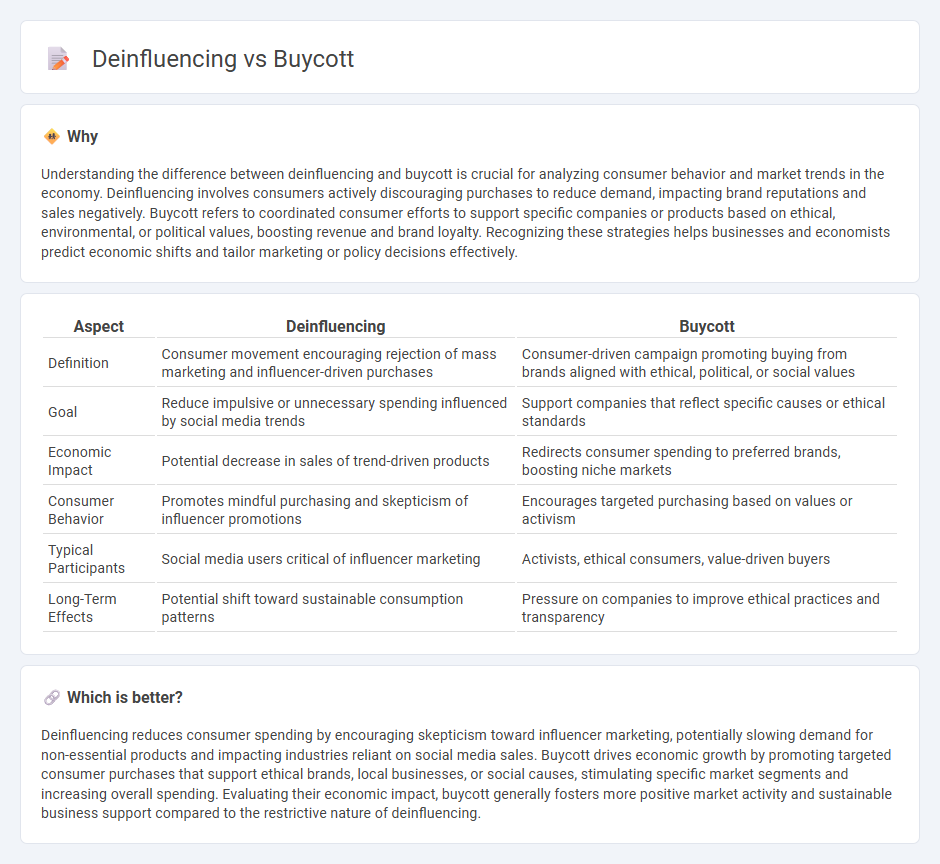
Deinfluencing emerges as a consumer movement rejecting marketing pressure by promoting minimalism and mindful spending, contrasting with buycott campaigns that encourage purchasing to support ethical businesses or causes. Both phenomena reshape economic behavior by leveraging social influence to shift demand patterns, affecting market trends and corporate strategies. Explore how these opposing forces are redefining consumer power and economic dynamics at the grassroots level.
Why it is important
Understanding the difference between deinfluencing and buycott is crucial for analyzing consumer behavior and market trends in the economy. Deinfluencing involves consumers actively discouraging purchases to reduce demand, impacting brand reputations and sales negatively. Buycott refers to coordinated consumer efforts to support specific companies or products based on ethical, environmental, or political values, boosting revenue and brand loyalty. Recognizing these strategies helps businesses and economists predict economic shifts and tailor marketing or policy decisions effectively.
Comparison Table
| Aspect | Deinfluencing | Buycott |
|---|---|---|
| Definition | Consumer movement encouraging rejection of mass marketing and influencer-driven purchases | Consumer-driven campaign promoting buying from brands aligned with ethical, political, or social values |
| Goal | Reduce impulsive or unnecessary spending influenced by social media trends | Support companies that reflect specific causes or ethical standards |
| Economic Impact | Potential decrease in sales of trend-driven products | Redirects consumer spending to preferred brands, boosting niche markets |
| Consumer Behavior | Promotes mindful purchasing and skepticism of influencer promotions | Encourages targeted purchasing based on values or activism |
| Typical Participants | Social media users critical of influencer marketing | Activists, ethical consumers, value-driven buyers |
| Long-Term Effects | Potential shift toward sustainable consumption patterns | Pressure on companies to improve ethical practices and transparency |
Which is better?
Deinfluencing reduces consumer spending by encouraging skepticism toward influencer marketing, potentially slowing demand for non-essential products and impacting industries reliant on social media sales. Buycott drives economic growth by promoting targeted consumer purchases that support ethical brands, local businesses, or social causes, stimulating specific market segments and increasing overall spending. Evaluating their economic impact, buycott generally fosters more positive market activity and sustainable business support compared to the restrictive nature of deinfluencing.
Connection
Deinfluencing involves consumers rejecting persuasive marketing tactics from influencers and brands, leading to more conscious purchasing decisions. Buycott acts as a collective response by encouraging consumers to support products and companies aligned with ethical, social, or environmental values. Together, deinfluencing and buycott empower individuals to reshape economic demand and promote more responsible consumption patterns.
Key Terms
Consumer Behavior
Buycott emphasizes consumer activism by encouraging purchases aligned with ethical values, highlighting support for brands that reflect social or environmental causes. Deinfluencing challenges traditional influencer marketing by promoting conscious consumerism and discouraging impulsive buying driven by online trends. Explore deeper insights into how these movements reshape consumer behavior and market dynamics.
Ethical Consumption
Buycott campaigns encourage consumers to support businesses with responsible sourcing and fair labor practices, enhancing ethical consumption by directing spending power toward positive change. Deinfluencing challenges overconsumption by urging individuals to reject trends driven by social media marketing, promoting more mindful and sustainable buying habits. Explore how these movements reshape consumer behavior and foster a more ethical marketplace.
Market Influence
Buycott leverages collective consumer power to drive market change by supporting ethical brands and boycotting unethical ones, directly influencing corporate behavior through purchasing decisions. Deinfluencing challenges the pervasive impact of social media influencers by promoting skepticism and reducing impulsive buying, reshaping consumer habits and market demand. Explore how buycott and deinfluencing strategies can transform market influence and consumer activism.
Source and External Links
Buycott | Vote with Your Wallet - UPC Lookup Database, Find ... - Buycott is a free app that uses UPC barcode scans to help consumers boycott products they oppose and find sustainable alternatives to support causes they care about.
Buycott.com - Wikipedia - Buycott.com is a platform and smartphone app enabling users to scan barcodes, align purchases with their values by joining campaigns, and "vote with their wallet" to support or avoid businesses based on social and corporate responsibility issues.
buycott - Wiktionary, the free dictionary - A buycott is the opposite of a boycott, meaning deliberately purchasing a company's or country's products to show support for their policies or counter a boycott.
 dowidth.com
dowidth.com